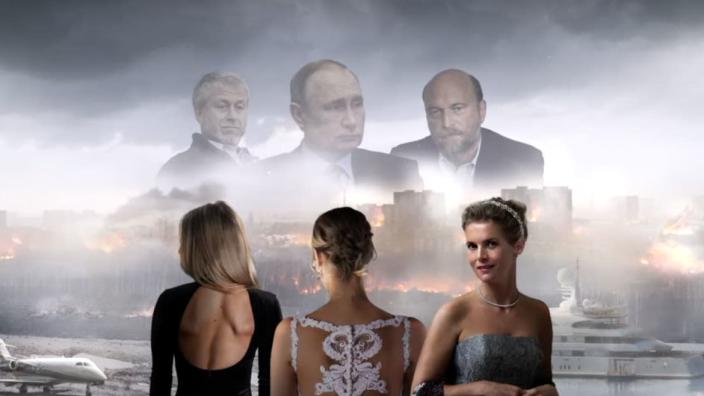
According to everyone featured in Secrets of the Oligarch Wives, Vladimir Putin is a ruthless, greedy, sociopathic monster who cares only about his own power, wealth and legacy as a titan who united and restored the glory of Mother Russia. The ongoing war in Ukraine, as well as the continued imprisonment and mistreatment of opposition leader Alexei Navalny, corroborates those claims, although the true hook of Paramount+’s documentary about the Russian president is its insider commentary from the women who were closest to the authoritarian’s oligarchs. What they have to say isn’t particularly shocking, but it’s certainly further evidence that the world is in peril from a man willing to do anything, to anyone, to achieve his own ends.
Narrated by Ranvir Singh and executive produced by Justine Kershaw, Laura Jones and David McNab, Secrets of the Oligarch Wives (out June 28) is a portrait of Putin as “the most dangerous man on the planet,” told largely by a collection of women with ties to bigwigs whose lives were deeply affected by him. There are only two nominal “oligarch wives” spotlighted by this 90-minute documentary—Countess Alexandra Tolstoy, distant relative of famed writer Leo Tolstoy, who spent years alongside oligarch Sergei Pugachev; and Tatiana Fokina, the spouse of exiled mobile-phone oligarch Evgeny Chichvarkin—and even then, the former was never formally married to her Russian billionaire partner. In terms of false advertising, this is a moderate case, if not an ultimately disastrous turn of events, given that the speakers do an adequate job providing first-hand accounts of the turmoil and terror wrought by Putin against anyone who dares stand in his way.
Inside Sundance’s Top-Secret Documentary on Putin Target Alexei Navalny
For its opening third, Secrets of the Oligarch Wives functions as a basic primer on Putin’s rise to power. When the Soviet Union fell in 1989, Putin was a KGB agent stationed in Dresden, East Germany, and in Russia’s ensuing “wild west” of the 1990s under President Boris Yeltsin, he rose through the country’s political ranks, eventually becoming Yeltsin’s successor when the leader abruptly resigned from his post on December 31, 1999. According to financier and political activist Bill Browder, Yeltsin had propped up his failing nation—wracked by pervasive unemployment, food shortages, and crumbling state industries—by selling 40% of the country to 22 oligarchs, borrowing money from them and then defaulting on the loans. This created a class of oligarch billionaires with not only untold riches but massive political clout, and this group hand-selected Putin as Russia’s new president, assuming he was a “boring functionary” who’d do their bidding.
They were wrong. Though Yeltsin had turned a blind eye to the oligarchs, who basically operated as mafia bosses, Putin decided that he’d become Russia’s chief Godfather, demanding huge cuts of their profits (and their unwavering loyalty), and dishing out severe penalties for anyone who disobeyed his wishes. For critical voices in the FSB like Alexander Litvinenko, that meant fatal poisoning. For his former businessmen allies, it meant criminal prosecution and the seizure of assets. Far from a “malleable pawn,” Putin revealed himself to be a cagey tyrant with no limits. Yet since he’d initially appeared to be a young, vibrant, open-to-the-West “breath of fresh air,” most were happy to overlook his more dictatorial actions. Even when the mysterious deaths of opponents began piling up, those crimes were carried out with enough plausible deniability to provide others with justification for continuing to do business with him.
[embedded content]
All of this is well-trod territory, and Secrets of the Oligarch Wives is hardly thorough enough to be a real non-fiction history lesson. Nonetheless, it gets the general background details right, and embellishes that familiar material with stories from Tolstoy and Fokina. For the former, life with Pugachev was a whirlwind of glamorous yachts and ritzy palaces, which she makes no bones about having loved—at least until Putin decided to turn on his former confidant and send him fleeing to France. Fokina, meanwhile, didn’t meet Chichvarkin until after he had escaped Russia following Putin’s attempts to confiscate his empire and prosecute him for all manner of offenses. In both instances, the women dispense tales about Putin’s nastiness, little-man complex, and brutality, which are then complemented by similar remarks from Litvinenko’s widow Marina as well as Browder, whose colleague was killed after speaking out against Russian corruption, and who—in a stunning archival press-conference clip—is singled out as an enemy by Putin, at which point Donald Trump voices his support for the Russian leader’s autocratic intentions.
Tolstoy takes viewers on a car-ride tour of some of the many mansions that the oligarchs own (or previously owned) in London, where so many have fled over the past twenty years. Yet just as Secrets of the Oligarch Wives leaves Tolstoy’s personal details vague, so too does the documentary refuse to pointedly question her about her willingness to get into bed with a shady criminal simply because his affluence and influence were enticing. Even Browder, who speaks harshly about Putin, is barely identified, such that his current position in Putin’s crosshairs comes across as a fact devoid of meaningful context. Talk about Putin’s own humble upbringing, and later enthusiasm for living in the lavish Kremlin, are eventually fingered as potential reasons for his merciless tyranny, but that angle also feels thin and underdeveloped.
The ongoing siege of Ukraine is briefly addressed toward the close of Secrets of the Oligarch Wives, and it serves as the latest and most heartbreaking example of Putin’s viciousness. Fokina surmises that Putin is willing to do anything because he’s secretly ill, while Browder suggests that he’s a mentally unwell madman who lacks empathy, a conscience, and normal human emotions—and has for his entire life. A wealth of old clips cast Putin in an unflattering light, depicting him as a stone-faced creep. Unfortunately, just about any nightly news broadcast could tell you the same thing, and without the pretenses of this rather shallow documentary, which purports to deliver untold secrets about Russia’s elite from the women who were once a part of it, and yet mostly mixes well-publicized facts and scattered anecdotes to unenlightening results.
Get the Daily Beast’s biggest scoops and scandals delivered right to your inbox. Sign up now.
Stay informed and gain unlimited access to the Daily Beast’s unmatched reporting. Subscribe now.




